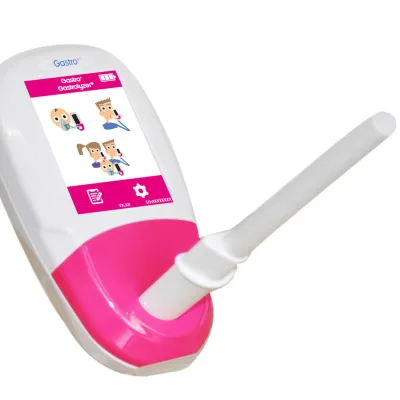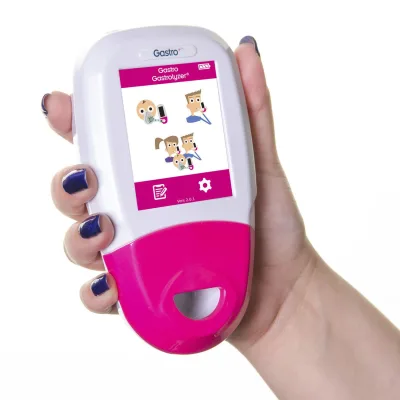In a healthy person at rest, hydrogen in the exhaled air is completely absent, since it is not produced in the process of metabolism. The release of hydrogen begins when some carbohydrates are broken down by anaerobic bacteria in the intestine. The overwhelming number of bacteria in the colon belong to anaerobes. Anaerobic bacteria are normally found in small amounts in the small intestine, mainly in the terminal part of the small intestine.
In some pathological conditions (excess bacterial growth), the amount of anaerobic bacteria in the small intestine can increase significantly, which leads to increased production of gases (including hydrogen).
Along with the liver and kidneys, the lungs were recognized as “excretory organs”. Exhaled air often contains gases that are formed during the metabolism of intestinal bacteria. One of them is hydrogen, which can be determined with the help of available devices for breathing tests.


The hydrogen formed in the lumen of the intestine is absorbed, enters the systemic blood stream and then is released by the lungs as a component of exhaled air, where the concentration can be measured.
Measurement of the concentration of hydrogen in exhaled air allows you to estimate the level of activity of anaerobic bacteria in the intestines, as well as to identify deviations from the norm. The time for which the concentration of hydrogen increases during the breath test indicates the part of the intestine in which fermentation processes occur.
A hydrogen breath test is prescribed by a therapist or a gastroenterologist. This is a modern method of diagnosing disorders of intestinal microflora (microbiota) and intolerance of some food components (for example, lactose and fructose). The study is carried out using a portable monitor to determine the level of hydrogen in exhaled air.
The method is indicated for patients with abdominal distension and excessive gas formation, stool disorders (diarrhea type), suspicion of poor tolerance of milk sugar (lactose) and fructose.
Since abdominal distention and stool weakening are often observed in patients with excessive bacterial growth syndrome (SIBO), and SIBO itself is a consequence of other gastroenterological diseases, the hydrogen breath test is indicated for patients with the following diseases.
Indications
Patients with diseases of the digestive system:
- chronic gastritis and functional dyspepsia
- dysfunction of the gallbladder and bile ducts
- chronic pancreatitis (including with symptoms of exocrine pancreatic insufficiency)
- cholelithiasis
- liver cirrhosis
- diabetes mellitus
- functional constipation
- irritable bowel syndrome
- lactase deficiency (including adult hypolactasia)
- fructose intolerance
The hydrogen breath test should be performed in the presence of symptoms such as:
- flatulence or bloating
- stool disorders (loose bowel movements or constipation)
- bitterness and unpleasant taste in the mouth
In the following cases:
- with long-term use of drugs that suppress the production of hydrochloric acid in the stomach (the so-called group of proton pump inhibitors: omeprazole, rabeprazole, pantoprazole, esomeprazole, lansoprazole, etc.)
- after operations on the stomach and intestines.
Contraindications
Absolute contraindications:
- In the presence of episodes of a sharp decrease in blood glucose both on an empty stomach and after meals
- Existing fasting hypoglycemia (postprandial hypoglycemia)
- Use of laxatives, in particular lactulose in the last 4 days
- Patients with previously diagnosed lactose intolerance (intolerance to dairy products, most often in the form of severe loosening of the stool)
- X-ray barium exam or irrigoscopy (within the last 7 days prior to the examination)
Relative contraindications:
- Use of antibiotics (in the last 4 weeks before the study)
- A colonoscopy (in the last 4 weeks before the study)
- X-ray barium exam or irrigoscopy (within the last 4 weeks prior to the examination)
- Ileostomy (surgery on the small intestine in the form of removing part of it through an opening in the abdominal wall outward).
Methodology
The test is performed in the morning on an empty stomach.
First, an initial sample of exhaled air is obtained, for this the patient takes a deep breath and exhales as much as possible into a special hardware device. Then the patient takes 30 ml of a fructose / lactose / lactulose solution orally, depending on the purpose of the diagnostic procedure. For 2-3 hours, every 15-20 minutes in the described manner, samples of exhaled air are collected. All obtained samples are analyzed on a hydrogen analyzer.
The test lasts on average 120 – 180 minutes.
The test for lactase deficiency and fructose intolerance is performed on different days.
Lactulose, lactose and fructose can cause symptoms such as increased gas formation, bloating, cramps or diarrhea. But these symptoms are temporary, which should not cause concern.
Preparation
- The hydrogen breath test is done on an empty stomach, so a light dinner is recommended.
- It is prohibited to consume any type of alcoholic or low-alcohol beverages or the following foods 24 hours before the hydrogen breath test: milk, onions, garlic, cabbage, any juices, pickled vegetables, legumes, or chew gum.
- It is not recommended to smoke or chew gum 2 hours before the test and during the test.
- Before the hydrogen breath test, it is prohibited to take alcohol-containing medications (1 day before), laxatives (at least 3 days before), antibiotics (at least 4 weeks before), proton pump inhibitors (omeprazole, rabeprazole, esomeprazole, pantoprazole, dexlansoprazole), bismuth preparations (De-nol, ulcavis, etc.), probiotics (at least 2 weeks before).
- On the day of the test, you can take medications (except vitamins, laxatives, and antibiotics), washing them down with water. On the day of the test, do not wear or fix dentures, as adhesives for their fixation can reduce the reliability of the results obtained.
- It is recommended to brush your teeth in the morning before the hydrogen breath test.
- You should refrain from physical exercise 2 hours before the test.
The lack of quality preliminary preparation for the hydrogen breath test affects not only the reliability of the test result, but also the possibility of conducting it in general. If the basal level of hydrogen in the exhaled air exceeds or is equal to 5 units, the test will be rescheduled for another date.
What is the result of the test?
The doctor who conducted the test issues a conclusion.
In case of a positive result, i.e. detection of small intestinal bacterial overgrowth syndrome, a consultation with a gastroenterologist is necessary to decide on the appointment of treatment and possible additional studies.
Why in GASTRO CLINIC?
- The hydrogen breath test is not carried out in all medical institutions, in Armenia the test is carried out only in our center.
- Based on the examination results, you can receive a highly qualified consultation from an expert gastroenterologist who will prescribe you adequate treatment.
- If necessary, it is possible to undergo additional diagnostic procedures to clarify the diagnosis (ultrasound, laboratory tests).
- The study is carried out in comfortable conditions for you.
Price list for examinations
- Breath hydrogen test for SIBO – 18,000 ֏
- Breath test for lactose intolerance – 18,000 ֏
- Breath test for fructose intolerance – 14,000 ֏
- Breath test for glucose intolerance – 14,000 ֏
- Breath test for sorbitol intolerance – 12,000 ֏
- Breath test for xylitol intolerance – 12,000 ֏

